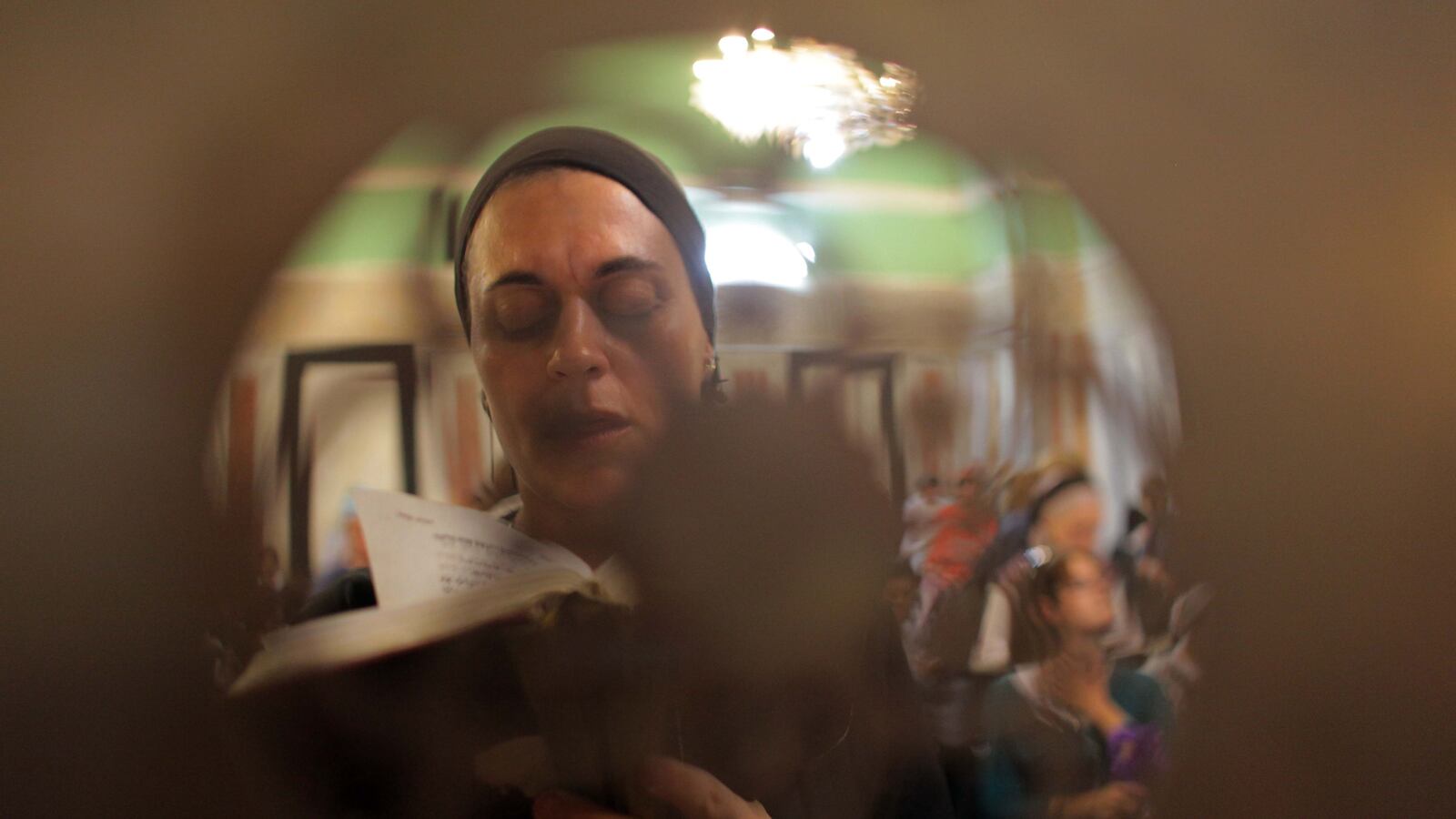
If you’re hoping that Israel’s Orthodox community is coming around to a more egalitarian approach to life in the Jewish State—you know, an approach that doesn’t vandalize women’s faces on posters, doesn’t spit on women praying, and doesn’t make women ride at the literal back of the bus—well, I’m not sure your hope is well-placed.Reporting on “Asi and Tuvia,” a new internet series produced for the dati leumi sector (“national religious,” that is: Israel’s largely right-wing modern Orthodox community) Tamar Rotem writes in Haaretz that:
[“Asi and Tuvia”] is actually pretty relatable, even for a secular audience…. It's only when watching a whole batch of episodes in a row that one notices something startling: None of them feature a single girl or a woman.
Just to be clear: “Asi and Tuvia” isn’t geared toward the ultra-Orthodox. Israel’s ultra-Orthodox aren’t likely to have TVs or computers in their homes, and if they do, the kids aren’t sitting and watching smiling men in knitted kippot, they’re being kept very far away.No, this woman-free landscape is created specifically with the modern Orthodox in mind.
Arutz Meir caters specifically to families from the religious Zionist sector, a population which has moved more and more in recent years toward gender-segregation and the exclusion of women…. Public singing by women, even by 4-year-old girls, is no longer permissible, let alone on-screen. In fact, any mention of women has been removed from many of the schoolbooks used in religious schools.
The absence of women has become especially prominent in illustrated Jewish texts, such as the Passover Hagaddah and the Megillat Esther for Purim. “It’s absurd that there are now Hagaddah books in which it looks as if only men left Egypt,” says Rachel Azaria, a Jerusalem councilwoman who represents the Yerushalmim Party and is one of the leading figures in the struggle against gender-segregation and the exclusion of women.
“Our religious Zionist kindergarten had a Passover Hagaddah in which Pharaoh’s daughter is pulling Moses out of the water. Only her hand could be seen; her face was hidden behind bushes," says Azaria…. "What is of concern here is the question of what part women play in the Jewish story.”
Given the growing number of kids being taught in Israel’s religious schools—nearly a quarter of all Hebrew-speaking kids—this trend isn’t some little religious curiosity, it’s a real problem. Witness, for instance, the fact that these state-funded schools now enforce segregated classrooms from the moment the girls leave third grade.
Women have only ever clung to the margins of the Jewish narrative, and it’s only been in the past half-century or so that brave women and their male allies have begun to successfully push back against the denial of our reality. Half of history’s Jews have already had their history systematically erased—every textbook devoid of women’s faces just makes the problem worse.
Needless to say, the reason for the removal of women from public discourse is because we might tempt or distract the men—a policy which a priori sexualizes women (and, apparently, four year old girls) just as badly (if not, in fact, more so) than secular society.
Asi Tzobel, co-star and content manager for the internet channel on which “Asi and Tuvia” is broadcast, describes himself as “more liberal” than some of the families to which his show is geared, but says that, regardless of his own opinions, “the Orthodox person looks at secular culture and sees a breakdown, a real catastrophe…. I can sympathize with these sentiments.”
Tamar Rotem continues:
But why not show girls and women in modest attire? Why should they be completely left out, and how does this address the supposed breakdown in society?
Tzobel acknowledges that total segregation may be extreme. “In navigation there is a term called 'deliberate deviation.' You aim slightly off-target in order to find the right path,” he says. “What is happening in the other [secular] camp offers no real alternative. So we try to follow a safe path, knowing that we can make adjustments later, as is happening now with the advent of a [religious] cable channel.”
“The other camp offers no real alternative.” Huh.
How’s this for an alternative: How about having enough respect for the divine image that the Holy One Blessed Be He invested in all humans to not see all women (and girls) everywhere as sirens attempting to lure the pure-hearted and vulnerable males of the species into acts of depravity? How about holding men responsible for their own actions? How about not fetishizing the female form until it no longer holds any humanity? How about not being afraid of the very sexuality with which the Holy One gifted us, in all His mercy?
Oh well. A woman can dream.
As long as she does it silently, and in the dark.






